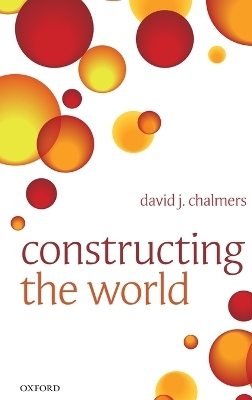
Constructing the World
Oxford University Press (Verlag)
978-0-19-960857-7 (ISBN)
David Chalmers develops a picture of reality on which all truths can be derived from a limited class of basic truths. The picture is inspired by Rudolf Carnap's construction of the world in Der Logische Aufbau Der Welt. Carnap's Aufbau is often seen as a noble failure, but Chalmers argues that a version of the project can succeed. With the right basic elements and the right derivation relation, we can indeed construct the world. The focal point of Chalmers' project is scrutability: the thesis that ideal reasoning from a limited class of basic truths yields all truths about the world. Chalmers first argues for the scrutability thesis and then considers how small the base can be. The result is a framework in "metaphysical epistemology": epistemology in service of a global picture of the world. The scrutability framework has ramifications throughout philosophy. Using it, Chalmers defends a broadly Fregean approach to meaning, argues for an internalist approach to the contents of thought, and rebuts W.V. Quine's arguments against the analytic and the a priori. He also uses scrutability to analyze the unity of science, to defend a sort of conceptual metaphysics, and to mount a structuralist response to skepticism. Based on Chalmers's 2010 John Locke lectures, Constructing the World opens up debate on central philosophical issues concerning knowledge, language, mind, and reality.
David Chalmers is Distinguished Professor of Philosophy and Director of the Centre for Consciousness at the Australian National University, and Professor of Philosophy at New York University. After studying mathematics at Adelaide and Oxford, he completed a PhD in philosophy and cognitive science at Indiana University in 1993. His 1996 book The Conscious Mind: In Search of a Fundamental Theory was highly successful with both popular and academic audiences. As director of the Center for Consciousness Studies at the University of Arizona from 1999 to 2004, and as a founder of the Association for the Scientific Study of Consciousness, he has played a major role in developing the interdisciplinary science of consciousness. He is well known for his formulation of the 'hard problem' of consciousness and his arguments against materialism. He has also written on topics as diverse as the nature of meaning, the foundations of artificial intelligence, and philosophical issues in The Matrix.
Acknowledgments ; Introduction ; How to Read this Book ; 1. Scrutability and the Aufbau ; 2. Varieties of Scrutability ; 3. Adventures with a Cosmoscope ; 4. The Case for A Priori Scrutability ; 5. Revisability and Conceptual Change ; 6. Hard Cases ; 7. Minimizing the Base ; 8. The Structure of the World ; Glossary ; Bibliography ; Index
| Erscheint lt. Verlag | 3.12.2012 |
|---|---|
| Verlagsort | Oxford |
| Sprache | englisch |
| Maße | 177 x 247 mm |
| Gewicht | 905 g |
| Themenwelt | Geisteswissenschaften ► Philosophie ► Erkenntnistheorie / Wissenschaftstheorie |
| Geisteswissenschaften ► Philosophie ► Metaphysik / Ontologie | |
| Geisteswissenschaften ► Philosophie ► Philosophie der Neuzeit | |
| Geisteswissenschaften ► Philosophie ► Sprachphilosophie | |
| ISBN-10 | 0-19-960857-1 / 0199608571 |
| ISBN-13 | 978-0-19-960857-7 / 9780199608577 |
| Zustand | Neuware |
| Informationen gemäß Produktsicherheitsverordnung (GPSR) | |
| Haben Sie eine Frage zum Produkt? |
aus dem Bereich

![Was heißt Denken?. Vorlesung Wintersemester 1951/52. [Was bedeutet das alles?] - Martin Heidegger](/media/113619842)
